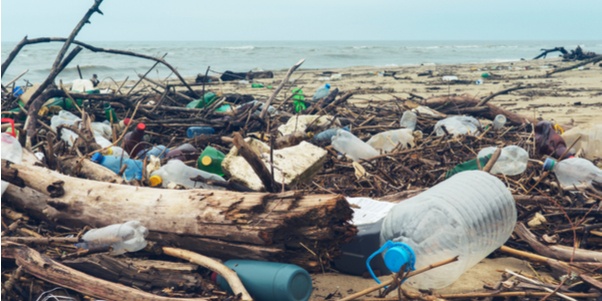Google the term plastic pollution and you’ll be jolted into the horrifying realisation of what un-recycled plastic is doing to our delicate planet. The enormity of the plastic epidemic is having devastating effects on wildlife, the ocean and as a result, us.
It’s a cheap, cheerful, throw-away material that’s revolutionised the consumer industry. Mouldable and inexpensive, plastic has lived up to its purpose as a convenient, multi-functional packaging tool. But after decades of profuse usage and ultimately, disposal, it now comes at an alarming cost - the cost of our planet.
But what happens when you dispose of that plastic is quite horrendous.
Over time, one plastic bottle bobbing along the ocean can break down into hundreds of tiny plastic pieces. These are ingested by fish and other wildlife, which are then ingested by us. Plastic pollution is responsible for some types of cancer, and microplastics account for the accumulation of toxic chemicals that can disrupt human hormones.
Staggering statistics reinforce the extent of the the epidemic. For example, if we don’t start to reduce our frivolous waste, there will be more plastic in the sea than fish by 2050.
The initiative
Worldwide initiatives already exist to help tackle the problem bit by bit. Businesses such as Blue Avocado and Sodastream are backing plastic alternatives and recycling initiatives.
In the same vein, big names such as Iceland and McDonald’s have pledged to start entirely eliminating plastic packaging, and a number of cosmetic companies have agreed to remove microbeads from their products.
But change is required on a larger scale if we are to make any difference to our polluted ocean.
The UK Government are already taking note. In 2016, the single-use 5p plastic bag tax was introduced. This has resulted in an 80% reduction in the number of plastic bags purchased - proof that small actions by individuals can make a huge dent in the volume of waste.
What we can do?
The UK is aiming to re-define what is possible in order to eliminate plastic waste. The approach must be a holistic one, and initially that means focusing on:
- Eliminating unnecessary and problematic single use
- The elimination of plastic straws
- Ensuring all plastic is reusable, recyclable or compostable
- Increasing the collection and recycling of plastic packaging
- Making it easy for citizens to recycle often
The rise of single-use plastic is one of the main contributors to the issue. That’s why so many big names have begun to substitute with biodegradable materials. Focusing on better recycling initiatives, material substitution, and where possible, the complete elimination of single-use plastic items are the most appropriate ways to respond.
Water bottles are a great example. When we’re out and about and we need water, often the only option is to purchase a bottle off the shelf. But if more locations offered refillable water stations, or water fountains, we would be in a better position to reuse our bottles.
Given the opportunity to act more responsibly, it’s likely that people will.
Will businesses survive?
It’s likely that businesses will thrive after demonstrating an active reduction in plastic usage.
It’s not just the environmental impact that businesses can benefit from, but the financial impact too.
Brands such as Marks & Spencer and Waitrose have reported significant cost savings from the reduction of plastic usage. And this type of financial gain could be reinvested into innovative alternatives, such as ‘mushroom packaging’, or other reusable packaging sources.
Meanwhile, research into sustainability suggests that brands demonstrating an active responsibility for environmental issues such as plastic pollution outperform those that don’t. For example, Unilever’s ‘Sustainable Living’ brands accounted for 60% of the company’s growth in 2016, and they grew 50% faster than the rest of the business.
Businesses who lead on innovation and set an example in environmental responsibility do so in alignment with their consumers’ values. This only works in the favour of brand loyalty, as customers are more likely to continue doing business with those they feel understand their values.
The simple and quite startling truth is this: humans are the sole perpetrators of this devastating problem. It is therefore, only down to us, to try and reverse it.
Business owners that feel a corporate social responsibility to demonstrate their commitment to sustainability might see a plastic reduction initiative as a good place to start.
The increasingly negative impact of plastic usage in all its guises is unequivocal. But if we all make our small contribution, it’ll stand the economy, our health, and our environment in good stead for the future.
Are you concerned about plastic waste as a business? Perhaps you have already started a plastic reduction initiative as a company - let us know more.




![The Bedford College Group logo [WHITE]](https://www.chamber-business.com/hs-fs/hubfs/The%20Bedford%20College%20Group%20logo%20%5BWHITE%5D.png?width=139&height=81&name=The%20Bedford%20College%20Group%20logo%20%5BWHITE%5D.png)
